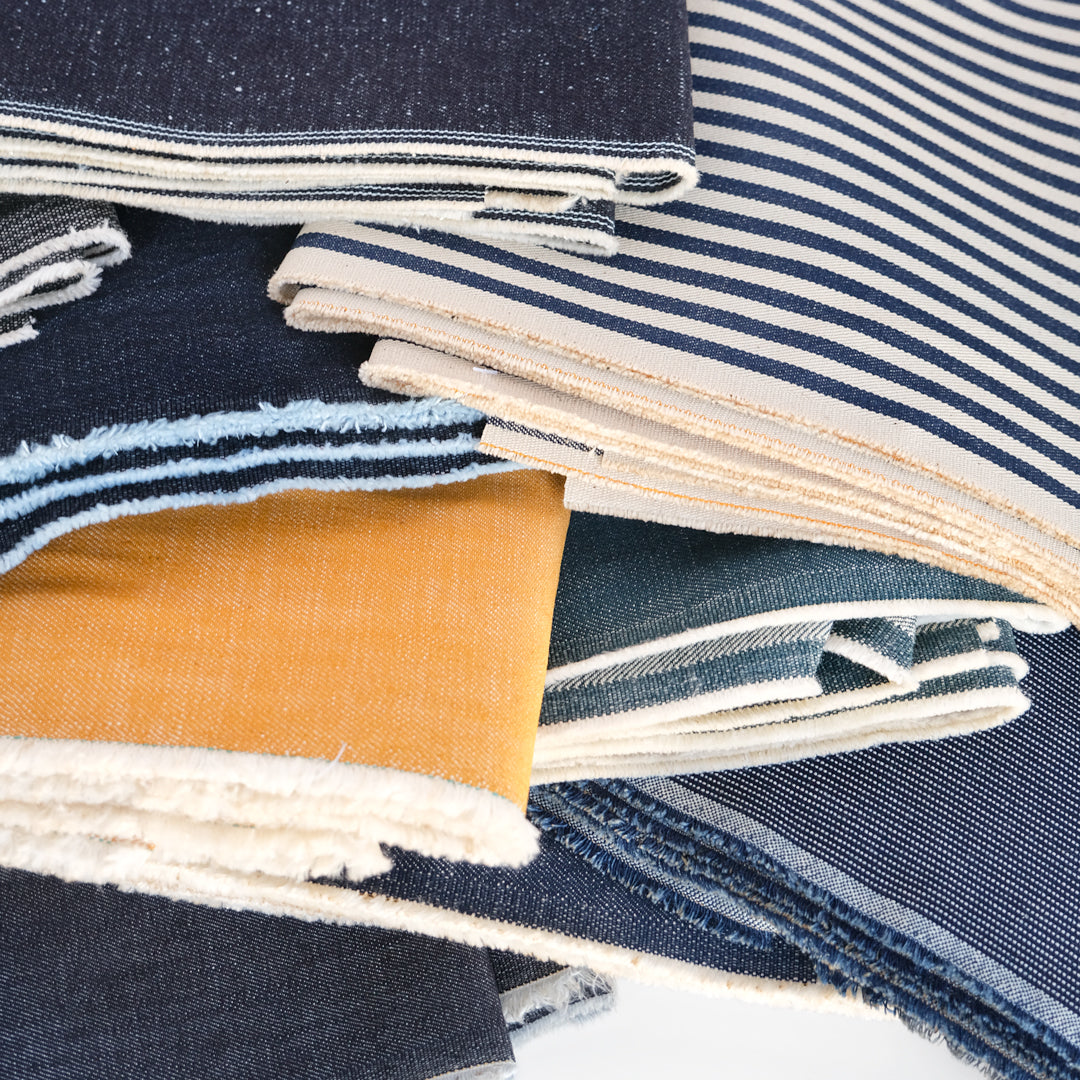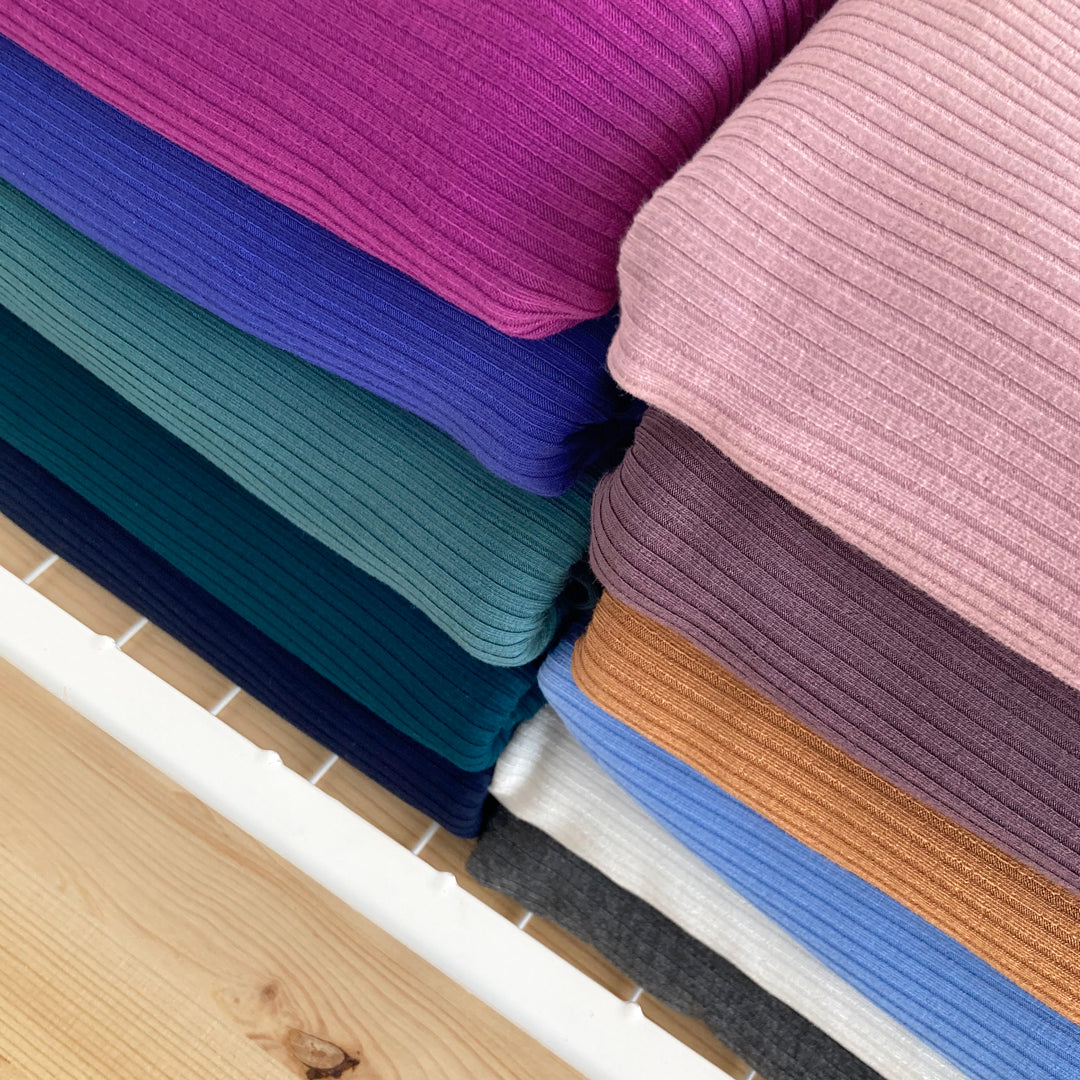We are huge raw denim fans here at Blackbird! Making and wearing your own pair of jeans is incredibly satisfying and we love the way that raw denim molds to the body, evolving overtime. Sewing with raw denim is surprisingly easy, thanks to the stable twill weave and majority cotton composition, but it does require a little extra finesse when it comes to washing and caring for your fabric.
To help you avoid any unintentional mishaps, we’ve compiled a list of tips and tricks to ensure you get the best possible washing results at home!

What is Raw Denim?
Before diving into the nitty gritty of denim care, let’s establish what raw denim actually is and how to identify it. Not all denim is ‘raw’, so it’s important to know what you’re working with to ensure you are handling your fabric appropriately.
As the name implies, raw denim is in a ‘raw’ state and has not gone through any other washes or treatments during the manufacturing process. Unlike most other fabrics you will encounter as a home sewist, the heavily concentrated dyes in raw denim have not been set in place and this is what causes them to disperse or fade with wash & wear.

Raw denim tends to feel stiff and starchy directly off the bolt making it easy to identify by the touch. If you are shopping online, and don’t have the chance to feel the denim in person, you can identify whether or not it’s ‘raw’ by specific descriptors in the title, or lack-there-of. Denims that mention the terms ‘bleached’, ‘washed’, or ‘bull denim’ are not raw and do not require special care.
While most ready-to-wear jeans and denim garments are not considered ‘raw’ off the shelf, they are almost always made from raw denim initially, and then stonewashed or distressed (or put through a variety of other treatments) after they are sewn up to mimic an authentic worn-in look. As a result, a large portion of the denim being produced, that we have access to in retail fabric shops like ours, is raw denim. While we do stock some great pre-washed options, like our 12oz Bleached Denim, if you’re looking to create a denim garment that will fade and wear in that non-uniform RTW style, then opting for raw denim is the way to go!

How To Care For Raw Denim
As we’ve established, raw denim dyes are not set in place. While this characteristic allows for the formation of a beautiful patina overtime, it also means that the colours will run and disperse in the wash. The most dramatic loss of dye will occur during the pre-washing stage so it’s particularly important to take extra care during this step of the process. To help guide you, we’ve compiled some of our favourite washing tips and techniques below.
Wash it solo
This one may be obvious but it’s worth noting nonetheless that you should not wash raw denim with other fabric or garments. For the first wash, we recommend washing only one piece of denim at a time as this sturdy fabric needs plenty of room in your machine for the dyes to disperse evenly. If your denim is particularly heavy and stiff (usually 12oz+), we would recommend sticking to 2 meters of fabric or less in the wash at one time.
Remember to ‘Floof’!
‘Floofing’ - the patented Blackbird term for unfurling and shaking out your fabric - is a good idea before washing most fabrics and an absolute MUST when washing raw denim. Creases and folds that are present within your yardage as it enters the wash may prevent the dyes from dispersing evenly which can lead to streakiness and inconsistent dye runs. Floofing prior to tossing your fabric in the wash is a quick and easy way to help eliminate those unwanted creases.
Pre-soak in the tub
If your denim feels super stiff off the bolt, floofing alone may not be enough to prevent dye streaks from forming in the wash. For those particularly rigid denims, we suggest pre-soaking your fabric in a tub or large basin to promote even dye dispersal. Adding some white vinegar to the water can also help set the dyes in place. From the tub, you can either opt to gently hand wash your fabric, which is best if you want to keep indigo dye loss to a minimum, or proceed with placing your fabric in the machine.
Pre-cut your pieces
Home washing machines can get claustrophobic when handling large pieces of rigid denim. Cutting out your pattern pieces prior to tossing them in the wash is a great option to prevent overloading your machine for those projects that require large cuts of fabric. You can pre-cut your pattern leaving an extra large amount of ease around each piece, wash your pieces in the machine, and then recut your pattern pieces to size once washed.
Iron out any noticeable marks
If, despite following all of the above steps, you still find an unwanted streak of dye on your washed fabric, try ironing the wrong side of the spot where the mark has occurred while the denim is still damp. Use a high heat for 100% cotton or a medium heat for stretch fabrics, and press with lots and lots of steam.
Hang it up or tumble dry
Tossing raw indigo denim in the dryer will speed up its evolution, initially becoming more vibrant and blue and then fading overtime. If you’re looking for a fast all over fade, then frequent tumble drying is your best bet. Adversely, if your goal is to preserve the dark colour of your denim, while achieving dramatic crease marks on your final garment, avoid the dryer altogether and keep washing to a minimum.
Skip it all!
While we prefer to wash and dry our fabric, true denim-heads wash raw denim as little as possible to allow fades and crease marks to form organically over time. If you’re happy with the colour and feel of your denim as-is, and don’t mind a significant ‘break-in’ period, you can by-pass the pre-washing stage and move straight onto cutting and sewing your garment. If you go this route, it is recommended to avoid machine washing or tumble drying your final garment as the fabric will shrink significantly. As an alternative, you can freeze your jeans periodically to kill bacteria and wash them super gently in a cool water tub when absolutely necessary.
Have any other questions about how to care for raw denim? Send us an email at info@blackbirdfabrics.com and we’ll do our best to help you out!
Shop our Denim here
Learn more:








Leave a comment
This site is protected by hCaptcha and the hCaptcha Privacy Policy and Terms of Service apply.